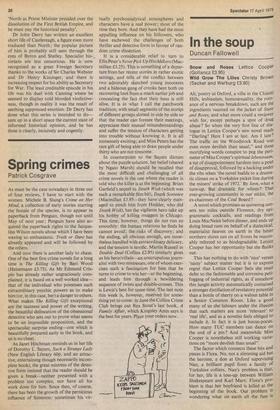Spring crimes
Patrick Cosg rave As must be the case nowadays in three out of four reviews, I have to start with the women. Michele B. Slung's Crime on Her Mind, a collection of early stories starring the female of the species, is to appear in paperback from Penguin, though not until May of next year; Penguin have also acquired the paperback rights to the Jacqueline Wilson novels about which I have been waxing so enthusiastic. Truth or Dare has already appeared and will be followed by the others.
And now there is another lady to chase. One of the best first crime novels for a long time is The Killing Gift by Bari Wood (Heinemann £3.75). As Mr Edmund Crispin has already rather ungraciously complained, it is based on a well worked idea— that of the individual who possesses such extraordinary psychic powers as to make him (or, in this case, her) a danger to others. What makes The Killing Gift exceptional are the tautness and power of the writing, the beautiful delineation of the obsessional detective who sets out to prove what seems to be an impossible proposition, and the spectacular surprise ending—one which is beautifully prepared early in the book, and so is no cheat.
As Janet Hitchman reminds us in her life of Dorothy L. Sayers, Such a Strange Lady (New English Library 60p, and an attractive, entertaining though necessarily incomplete book), the great mistress of the detective form insisted that the reader should be given a break—neither presented with a problem too complex, nor have all his work done for him. Since then, of course, there has been the growth of the pernicious influence of Simenon : sometimes his vir
tually psychoanalytical atmospheres and characters have a real power; most of the time they bore. And they have had the most appalling influence on his followers, who have eschewed the challenges of both thriller and detective form in favour of random crime dissection.
It is a considerable relief to turn to Ellis Peter's Never Pick Up Hitchhikers (Macmillan £3.25). This is something of a departure from her recent stories in rather exotic settings, and tells of the conflict between two admirably sketched young innocents and a hideous gang of crooks bent both on recovering loot from a much earlier job and concealing the fact that their boss is still alive. It is in what I call the patchwork tradition, with small segments of the stories of different groups slotted in side by side so that the reader can foresee their meetings, appreciate their mutual misunderstandings and suffer the tension of characters getting into trouble without knowing it. It is all Immensely exciting; and Miss Peters has the rare gift of being able to draw people under thirty who are not tiresome.
In counterpoint to the Sayers dictum about the puzzle solution, her belief (shared by Ngaio Marsh) should be recalled that the most difficult and challenging of all crime novels is the one where the reader is told who the killer is at the beginning. Brian Garfield's sequel to Death Wish (which was such a remarkable film hit), Death Sentence (Macmillan £3.95—they have clearly managed to pinch him from Hodder, who did Death Wish), has the vigilante hero take up his hobby of killing muggers in Chicago. This time, however, things do not run so smoothly: the human relations he finds he cannot avoid; the risks of discovery; and the ending, all obvious enough, are nonetheless handled with extraordinary delicacy, and the tension is terrific. Martin Russell in Double Deal (Collins £2.95) similarly gives us his hero/villain—an unscrupulous journalist with two mistresses, one of whom exercises such a fascination for him that he turns to crime to win her—at the beginning, and leads him through a bewildering sequence of twists and double-crosses. This is Lewis's best for some time. The last note this week is, however, reserved for something yet to come: in June the Collins Crime Club brings out Rex Stout's last book, A Family Affair, which Kingsley Amis says is the best for years. Place your orders now.


































 Previous page
Previous page